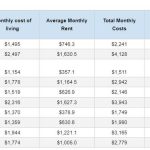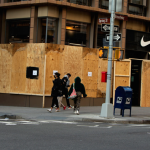Rabobank: A, B, Sea
By Michael Every of Rabobank
So, what did you miss if you were out for May Day? How about a flash crash in Swedish stocks; US stocks tumbling again, then staging a big rally at the end of the session; US Treasury yields up, with 10s +5bp and moving above 3% for a while; swings in oil prices and gas prices; gold down sharply; and CNH falling back to 6.67 again? Not bad for a Bank Holiday.
We also had Mortgage News Daily say if US fixed 30-year mortgage costs, which started 2022 at 3.29% and are now 5.55%, rise another 50bp, or home prices 5% more, or some combo of the two, then home affordability would be the worst on record. And that’s before we even get the first serious Fed hike this week, apparently opening the doors to many more to come this year alone. Yet given the cost of building a house is up in terms of materials and labor, it may be hard for prices to come down. That suggests a lot of new renters, and so higher rents, and so higher CPI due to how it is calculated, as covered before. Or, alternatively, a housing crash. Take your pick of outcomes. 2% CPI it does not say.
Meanwhile, on a very different topic, but also underlining how worrying the outlook is, perma-China-bull Stephen Roach just admitted in an interview that when he listed Covid lockdowns, the property sector, and the Ukraine war as all presenting downside risks to China’s economic prospects in ‘Downside Risks to Global Growth’, that he should also have listed common prosperity and the crackdown on tech:
“I think they are a big deal. I really do… these twin actions of cracking down on internet platform companies, and income and wealth redistribution under the guise of common prosperity are big risk factors for potential Chinese economic growth over the next several years. They go right to the heart of the productivity leverage that China really needs right now to offset the demographic headwinds of a rapidly aging and, potentially shrinking, population.”
His reason for excluding them was that “I’ve written about them so much,” –I missed his take on Marxist-Leninist theory, did you?– and “because, I don’t know, this just goes back to my old Wall Street days, when you make a point, this is just a dumb marketing point, you like to have three reasons to support your point, not four…., but in all honesty, I should have put it in.” So, it was all ‘Wall Street thinking’, which sounds about right.
Roach also points out that suggestions the Chinese government will hand out unemployment support to migrant labour portends worrying things, as “the last time I recall seeing that was during, actually right before the global financial crisis, when there were significant layoffs of migrant workers as well. And I think that’s worrisome because this is an unusual development and speaks to labour market distress that is rarely captured by the official unemployment data in China. And so the fact that the government’s moving may be an indication that the supply chain and repercussions of rolling COVID shocks is more serious than we’ve been led to believe.”
Indeed, consider that in light of last week’s call from the WTO Director-General that attempts to reshore manufacturing activities “should be limited to critical sectors”, which sounds like intellectual defeat: and what is and isn’t “critical” is complicated, and highly integrated.
Roach also talks of his surprise at China’s “shockingly rigid decision-making process that is number one, incapable of admitting a mistake and number two, not being nimble enough to come up with a different strategy.” Critics would point out that this is *always* the tendency in closed rather than open systems, which the likes of Roach overlooked while championing them, despite ample evidence that just such a shift was occurring.
Notably, he adds, “I’m worried that my legacy of great access [to China] is about to be constricted when this new book gets published because it does say some rather tough things about China that I haven’t ever really said in a book or an article before. And your connections are as good as your point of view, and this book is likely to be unsettling in some respects.” More Wall Street thinking there; but I would argue that if a point of view is good enough then it doesn’t need connections. The opposite view clearly has not worked of late in Chinese markets anyway: you have flag-waved yourself off a cliff.
Indeed, Chinese authorities have just slapped “Compulsory Measures” on a person named Ma in Hangzhou, base of Alibaba and Ant Group. The unidentified person was apparently placed under ‘controls’ on 25 April after being accused of “inciting subversion of state power and other activities that endangered national security.”
Of course, this could be anyone called Ma, because it’s a very common surname. But it sounds a lot more like common prosperity coming for Jack Ma. If so, it comes four days after the latest promise not to crackdown on tech further. Expect Chinese markets to slump again and CNH to follow. Don’t expect Roach’s book to be on sale in China, or even for him to be visiting again.
Speaking of suddenly seeing the obvious once the tide has turned, we are also seeing more ‘Bretton Woods 3’ market calls of imminent supply-squeezes on key commodities via geopolitical and geographic choke points. This is true.
However, those who deal with physical commodities and logistics, i.e., trade commodity finance –rather than central-bank liquidity acronyms– have been aware of these issues for a long time. They know where the world’s steel plants are located; where neon comes from; who makes semiconductors where, and which consumer and military goods require them; and how food and agri supply-chains work in normal times and under various stresses. A sub-set also look at the institutional memory of mercantilism, and how free trade has collapsed or shifted in the past, e.g., WW1’s impact on global grain flows; barter, offset, and countertrade; what Hjalmar Schacht tried to do; and how COMECON did and didn’t work. Also remember when in January 2021 Xi Jinping said, “We should increase the dependence of international supply chains on China and establish powerful retaliatory and menacing capabilities against foreign powers that would try to cut supplies“?
Wall Street analysts have mostly ignored these issues for years because everything was about demand (or lack of it): now it’s about *supply*. Sorry, but that takes different expertise. One needs to have that deeper industry, and historic view, in order to ‘game’ this all out ahead, as opposed to relying on ‘Wall Street thinking’.
Yes, one can say, “commodity supply squeezes”, and that is true. But someone from the agri side can equally say “More QE eventually” and be an ‘equity expert’ – just one without any detailed breakdown of how these acronyms will work to get central-bank liquidity from A to B; and, of course, never to C, nor “to sea”, which is where central-banks and mercantilism DON’T meet yet, but I argue relevant history shows will do again soon.
Meanwhile, caught deep in the middle of all this, and yet blissfully unaware because of its focus on house prices, house prices, and house prices, is the RBA. They are the first central bank to meet this week, and the market expectation is they will hike rates 15bp to 0.25%.
Tyler Durden
Tue, 05/03/2022 – 10:50
Source link












